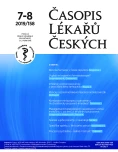-
Medical journals
- Career
Management of metabolic adverse effects of everolimus in patients with renal carcinoma
Authors: Jana Gregorová 1,2; Petra Holečková 3; Kateřina Žáková 1
Authors‘ workplace: Oddělení klinické farmacie, Nemocnice Na Bulovce, Praha 1; Ústav aplikované farmacie, Farmaceutická fakulta VFU, Brno 2; Ústav radiační onkologie 1. LF UK a Nemocnice Na Bulovce, Praha 3
Published in: Čas. Lék. čes. 2019; 158: 300-305
Category: Original Article
Overview
Everolimus is administered to patients with metastatic renal cell carcinoma in full daily dose of 10 mg or in reduced daily dose of 5 mg in case adverse effect occurred. These include metabolic adverse effects, mucositis, anorexia, and non-infectious pneumonitis and lead to increase in morbidity and decrease in the quality of life of the patient. Our goal was to evaluate the administration of fenofibrate and metformin in everolimus induced hypertriglyceridemia and hyperglycemia.
The role of mTOR in lipid and glucose metabolism was researched in literature. The effect of including fenofibrate and metformin into metabolic adverse effect management guidelines in metastatic renal cell carcinoma patients who are administered everolimus was evaluated.
Fenofibrate, metformin, and everolimus have several similar effects on intracellular level, therefore the effect of fenofibrate and metformin in treating everolimus induced metabolic adverse effects in metastatic renal cell carcinoma patients may be limited. The manifestation of metabolic adverse effects in patients treated with everolimus is not identical with metabolic syndrome or type II diabetes in standard population.
Keywords:
fenofibrate – everolimus – metabolic adverse effects – metformin – Renal cell carcinoma
Sources
- Li S, Kong Y, Si L et al. Phosphorylation of mTOR and S6RP predicts the efficacy of everolimus in patients with metastatic renal cell carcinoma. BMC Cancer 2014; 14 : 376.
- Vergés B, Walter T, Cariou B. Endocrine side effects of anti-cancer drugs: effects of anti-cancer targeted therapies on lipid and glucose metabolism. Eur J Endocrinol 2014; 170 : 43–55.
- Barthélémy P, Hoch B, Chevreau C et al. mTOR inhibitors in advanced renal cell carcinomas: from biology to clinical practice. Crit Rev Oncol Hematol 2013; 88 : 42–56.
- Aapro M, Andre F, Blackwell K et al. Adverse event management in patients with advanced cancer receiving oral everolimus: focus on breast cancer. Ann Oncol 2014; 25 : 763−773.
- Kaplan B, Qazi Y, Wellen JR. Strategies for the management of adverse events associated with mTOR inhibitors. Transplant Rev (Orlando) 2014; 28: 126–133.
- Laplante M, Sabatini DM. An emerging role of mTOR in lipid biosynthesis. Curr Biol 2009; 19(22): 1046−1052.
- Laplante M, Sabatini DM. Regulation of mTORC1 and its impact on gene expression at a glance. J Cell Sci 2013; 126 : 1713–1719.
- Ricoult S, Manning BD. The multifaceted role of mTORC1 in the control of lipid metabolism. EMBO Rep 2013; 14 : 242–251.
- Chen WL, Chen YL, Chiang YM et al. Fenofibrate lowers lipid accumulation in myotubes by modulating the PPARα/AMPK/FoxO1/ATGL pathway. Biochem Pharmacol 2012; 84 : 522–53.
- Kota BP, Huang TH, Roufogalis BD. An overview on biological mechanisms of PPARs. Pharmacol Res 2005; 51 : 85–94.
- Grabacka M, Pierzchalska M, Reiss K. Peroxisome proliferator activated receptor α ligands as anticancer drugs targeting mitochondrial metabolism. Curr Pharm Biotechnol 2013; 14(3): 342–356.
- Rui L. Energy metabolism in the liver. Compr Physiol 2014; 4(1): 177–197.
- Waickman AT, Powell JD. mTOR, metabolism, and the regulation of T-cell differentiation and function. Immunol Rev 2012; 249(1): 43–58.
- Peterson ME. Management of adverse events in patients with hormone receptor-positive breast cancer treated with everolimus: observations from a phase III clinical trial. Support Care Cancer 2013; 21 : 2341–2349.
- An H, He L. Current understanding of metformin effect on the control of hyperglycemia in diabetes. J Endocrinol 2016; 228, R97−R106.
- Widmer N, Bardin C, Chatelut E et al. Review of therapeutic drug monitoring of anticancer drugs part two – targeted therapies. Eur J Cancer 2014; 50 : 2020−2036.
Labels
Addictology Allergology and clinical immunology Angiology Audiology Clinical biochemistry Dermatology & STDs Paediatric gastroenterology Paediatric surgery Paediatric cardiology Paediatric neurology Paediatric ENT Paediatric psychiatry Paediatric rheumatology Diabetology Pharmacy Vascular surgery Pain management Dental Hygienist
Article was published inJournal of Czech Physicians

-
All articles in this issue
- Clinical pharmacy in the Czech Republic
- Is safe pharmacotherapy worthwhile?
- Specialization in clinical pharmacy
- Paediatric clinical pharmacist: a potential benefit?
- Drug administration via feeding tubes: examples, working group
- Proton pump inhibitors from clinical pharmacist’s point of view
- Clinically significant drug interactions of antiretrovirals
- Intrapleural alteplase therapy: what are the knowns and unknowns?
- Management of metabolic adverse effects of everolimus in patients with renal carcinoma
- Medication treatment of singultus in palliative care
- Combination of mirtazapine and paroxetine: possible clinically demonstrated interaction?
- Complication during hospitalization of geronto-psychiatric patient for fatal Stevens-Johnson syndrome – a multidisciplinary approach
- Sleep and its disturbances in neurology
- Sleep and sleep-related disorders in women
- Precision psychiatry – a feasible possibility?
- Přednáškové večery spolku českých lékařů v Praze (BŘEZEN 2020)
- Význam spánkové medicíny v pediatrii
- Principle of assessment and recognition of occupational diseases in the Czech Republic
- Journal of Czech Physicians
- Journal archive
- Current issue
- Online only
- About the journal
Most read in this issue- Medication treatment of singultus in palliative care
- Intrapleural alteplase therapy: what are the knowns and unknowns?
- Sleep and its disturbances in neurology
- Proton pump inhibitors from clinical pharmacist’s point of view
Login#ADS_BOTTOM_SCRIPTS#Forgotten passwordEnter the email address that you registered with. We will send you instructions on how to set a new password.
- Career

